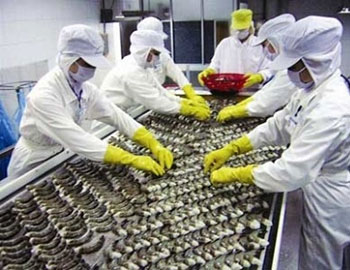FTA with EU will pave way for more exports

FIS | 5 April 2013
FTA with EU will pave way for more exports
The Free Trade Agreement (FTA) between Vietnam and the European Union (EU) is expected to open many doors for Vietnamese seafood to enter the EU, a market which consists of more than 500 million consumers and GDP of over USD 17,000 billion, according to the speech of Truong Dinh Hoe, general secretary of the Vietnam Association of Seafood Exporters and Producers (VASEP), at the “Vietnam-EU FTA” conference held in Ho Chi Minh city.
Seafood is one of the five main items exported to the EU with the annual revenue of over USD 1.1 billion. To make this happen, Vietnam’s fishery industry is pushing to meet importers’ requirements, such as hygiene standards.
In 2012, Vietnam’s seafood industry earned USD 1.13 billion from seafood exports to the EU, representing 18.5 per cent of the country’s total seafood exports, VietNamNet Bridge reports.
The country runs 567 industrial seafood processing plants, which can meet international food safety and hygiene standards (HACCP, GMP and SSOP). There are over 400 freezing factories that yield 7,500 tonnes of seafood per day and 415 processing plants that have been granted the EU code, compared to only 17 ones in 1999.
More than 100 pangasius farms with an area of 2,805 ha, or 40 per cent of the country’s pangasius farming area, have been awarded certificates for sustainability. Around 50 pangasius processors, or half of the total, have obtained the Global Good Agricultural Practices (GAP) certificate.
Further, eight companies have gained Best Aquaculture Practices (BAP) certification for both their processing plants and farms and 14 companies have received Aquaculture Stewardship Council (ASC) certificates for sustainable fish farming.
In this way, Vietnamese seafood products are increasingly meeting the standards set by importers, including the EU, VASEP highlighted.
The EU is imposing a 7 per cent duty rate on Vietnamese products and 10.8 per cent on seafood products. Consequently, with the help of the FTA, taxes levied on most Vietnamese goods to the EU will be removed, which will ease Vietnam exporters’ competition with other suppliers in EU market.
"Negotiating for the free trade agreement is very important, since the FTA will help reduce tariffs at the maximum level on Vietnamese seafood products, making Vietnamese seafood more competitive," Truong said.
In line with the FTA, the Vietnamese Government and national companies have made a lot of efforts to comply with legal regulations in accessing EU market. Firms have also made worked to invest and upgrade their processing plants and improve product quality.





